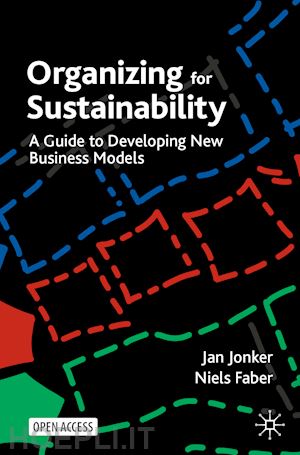
Questo prodotto usufruisce delle SPEDIZIONI GRATIS
selezionando l'opzione Corriere Veloce in fase di ordine.
Pagabile anche con Carta della cultura giovani e del merito, 18App Bonus Cultura e Carta del Docente
This upper-level Open Access textbook aims to educate students and professionals on how to develop business models that have a positive impact on people, society, and the social and ecological environment. It explores a different view of how to organize value creation, from a focus on an almost exclusively monetary value creation to one that creates positive impact through multiple values.
The book offers students and entrepreneurs a structured approach based through the Business Model Template (BMT). It consists of three stages and ten building blocks to facilitate the development of a business model. Users, be they students or practitioners, need to choose from one of the three offered business model archetypes, namely the platform, community, or circular business models. Each archetype offers a dedicated logic for vale creation. The book can be used to develop a business model from scratch (turning an idea into a working prototype) or to transform an existing business model into one of the three archetypes. Throughout the book extra sources, links to relevant online video clips, assignments and literature are offered to facilitate the development process.
This book will be of interest to students studying the development of business models, sustainable management, innovation, and value creation. It will also be of interest executives, and professionals such as consultants or social entrepreneurs seeking further education.Chapter 1: Speaking of transitions.- Chapter 2: Business Modelling.- Part 1: Definition Stage.- Chapter 3: Motive and context.- Chapter 4: The dream.- Chapter 5: The value proposition.- Part 2: Design Stage.- Chapter 6: Business model archetypes.- Chapter 7: Parties involved.- Chapter 8: Strategy.- Chapter 9: Core activities.- Chapter 10: External test.- Part 3: Result stage.- Chapter 11: Impact.- Chapter 12: Value(s) Creation.- Chapter 13: Alternative routes.- Chapter 14: The art of doing.- Chapter 15: Epilogue.
Jan Jonker is a specialist in the field of sustainability and circularity. He is employed as a professor at the Nijmegen School of Management (NSM) at Radboud University Nijmegen (RU – Holland) where he holds the chair of ‘Sustainable Entrepreneurship’. From 2014–2016 he also held the Chaire d’ Excellence Pierre de Fermat position at the Toulouse Business School (TBS) in Toulouse (France). From 2017–2018 he was also the chairholder of the Emile Francqui Chair at the Free University in Brussels, Belgium. Professor Jonker’s research interests are at the crossroads of management, corporate social responsibility (CSR) and sustainable development (SD); specifically, the development of strategies for sustainability and related (new) business models.
Niels Faber is assistant professor of Circular Entrepreneurship at the Campus Fryslân Faculty of the University of Groningen in Leeuwarden (the Netherlands) and lecturer-researcher at the International Business School and Knowledge Centre Bio-based Economy of the Hanze University of Applied Sciences in Groningen (the Netherlands).His research focuses on the organisational aspects of, and business models for, sustainability and the circular economy.











Il sito utilizza cookie ed altri strumenti di tracciamento che raccolgono informazioni dal dispositivo dell’utente. Oltre ai cookie tecnici ed analitici aggregati, strettamente necessari per il funzionamento di questo sito web, previo consenso dell’utente possono essere installati cookie di profilazione e marketing e cookie dei social media. Cliccando su “Accetto tutti i cookie” saranno attivate tutte le categorie di cookie. Per accettare solo deterninate categorie di cookie, cliccare invece su “Impostazioni cookie”. Chiudendo il banner o continuando a navigare saranno installati solo cookie tecnici. Per maggiori dettagli, consultare la Cookie Policy.